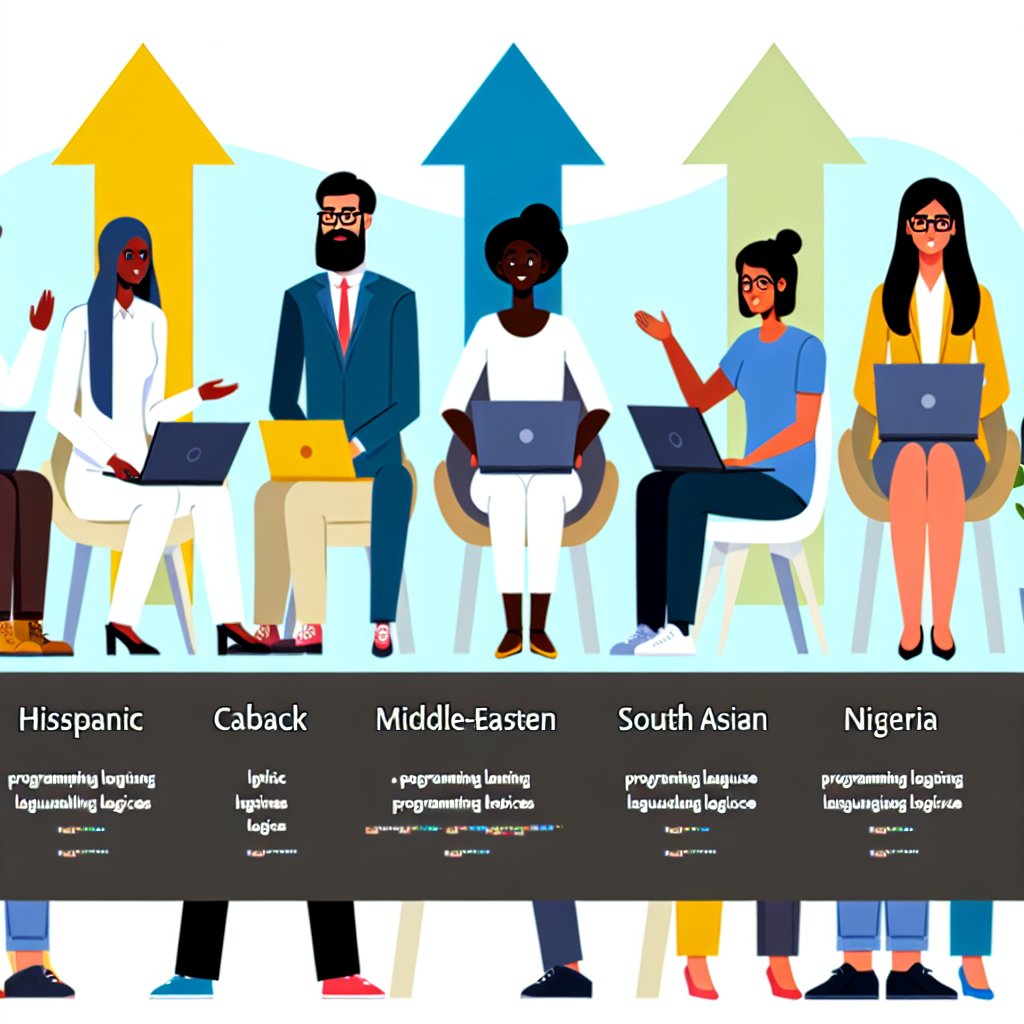Introduction to Choosing the Right Programming Language for Nigerian Startups
Significance of the Programming Language Choice
The choice of programming language greatly influences a startup's success.
A well-chosen language accelerates product development and reduces costs.
Moreover, it affects the scalability and maintainability of the software.
Therefore, it is crucial for founders to understand their technology options.
For example, startups like Lumos Technologies Nigeria have thrived due to smart language choices.
Factors Influencing Language Selection in Nigeria
Startups must consider local developer availability when choosing a programming language.
Additionally, the community support plays a vital role in resolving development challenges.
Furthermore, language versatility for web, mobile, and backend systems matters.
Cost-effectiveness and learning curve also influence the decision-making process.
Consequently, Nigerian startups should balance global trends with local realities.
Role of Programming Language in Startup Growth and Innovation
The right language empowers startups to innovate rapidly in competitive markets.
It enables quick adoption of new technologies and integration with existing systems.
Also, it improves collaboration among developers and stakeholders.
Startups using efficient languages often secure better investment opportunities.
Selecting the optimal programming language fuels sustainable growth.
Unlock Your Unique Tech Path
Get expert tech consulting tailored just for you. Receive personalized advice and solutions within 1-3 business days.
Get StartedOverview of the Nigerian Tech Ecosystem and Startup Environment
Rapid Growth of the Tech Sector
Nigeria’s tech ecosystem experiences rapid expansion every year.
Entrepreneurs like Chinedu Eze and companies such as Innoventures Nigeria drive this growth.
Moreover, increased internet penetration fuels access to digital services nationwide.
Consequently, Lagos, Abuja, and Port Harcourt have emerged as major tech hubs.
Supportive Infrastructure and Investment Climate
The government promotes innovation through policies and funding initiatives.
Organizations like the Nigerian Startup Fund offer capital to promising ventures.
Incubators such as TechHub Lagos monitor startups and provide mentorship programs.
Furthermore, international investors now show keen interest in Nigerian startups.
Key Sectors Driving Innovation
Fintech leads with solutions from companies like Paystack and Flutterwave.
Agri-tech startups, including Farmcrowdy, enhance farming practices and market access.
Healthtech players such as Helium Health improve healthcare delivery and records management.
Additionally, e-commerce platforms continue to revolutionize retail experiences.
Challenges Impacting Startup Success
Startups face struggles with limited access to skilled developers.
Power supply issues add operational difficulties for tech companies.
Unlock Premium Source Code for Your Projects!
Accelerate your development with our expert-crafted, reusable source code. Perfect for e-commerce, blogs, and portfolios. Study, modify, and build like a pro. Exclusive to Nigeria Coding Academy!
Get CodeMoreover, complex regulatory environments sometimes slow down business growth.
However, ongoing reforms aim to address these obstacles effectively.
Community and Networking Opportunities
Events like Nigeria Tech Summit gather entrepreneurs and investors regularly.
Communities such as Abuja Coders help developers collaborate and learn.
These networks foster innovation and open doors to partnerships.
They also encourage knowledge sharing and skill development across sectors.
Criteria for Selecting a Programming Language Suitable for Nigerian Startups
Scalability and Performance
Nigerian startups require programming languages that scale efficiently with growth.
Performance plays a critical role in user experience and system reliability.
Therefore, startups should choose languages that support fast execution and easy scaling.
For example, Go and JavaScript frameworks have proven scalability for web applications.
Consequently, a language's ability to handle increasing workloads matters greatly.
Community Support and Ecosystem
A strong developer community helps startups find solutions quickly.
Languages with large ecosystems offer numerous libraries and tools for rapid development.
In Nigeria, access to community support reduces development costs and timelines.
JavaScript, Python, and PHP have well-established communities suitable for startups.
Moreover, vibrant ecosystems encourage knowledge sharing and collaboration.
Cost Effectiveness and Availability of Talent
Startups in Nigeria must consider the availability of skilled developers.
Choosing popular languages lowers recruitment and training costs.
Languages such as Python and PHP have many local developers in Nigeria.
This availability ensures faster project delivery and maintenance.
Additionally, startups benefit from affordable development without compromising quality.
Ease of Learning and Development Speed
Startups often operate with limited time and resources.
Therefore, selecting languages that accelerate development is crucial.
Languages like Python and JavaScript enable quick prototyping and iteration.
They also simplify onboarding new developers or co-founders.
Thus, development speed strongly influences a startup's market entry success.
Integration and Versatility
Startups need languages that integrate with existing systems and APIs.
Versatile languages support both frontend and backend development tasks.
For instance, JavaScript can be used across the full stack with frameworks like React and Node.js.
This flexibility reduces complexity and technical overhead.
As a result, startups can build cohesive products efficiently.
Security and Compliance
Security is a top priority for startups handling sensitive user data.
Languages with strong security features minimize risks of breaches.
Startups should also consider compliance requirements within Nigeria.
For instance, frameworks with built-in security tools offer an advantage.
Hence, a secure programming environment fosters user trust and regulatory adherence.
Long-Term Maintenance and Support
Startups must plan for continuous application updates and bug fixes.
Choosing stable and well-supported languages eases long-term maintenance.
Languages with regular updates and documentation ensure sustainability.
Hence, language choice impacts a startup's ability to adapt over time.
This foresight prevents costly reworks and technical debt.
Gain More Insights: How Programming Languages Drive AI Development in Nigeria
Popular Programming Languages Used by Nigerian Startups
JavaScript for Versatile Web Development
JavaScript remains the backbone of many Nigerian startup projects.
It enables dynamic, interactive web applications effortlessly.
Moreover, frameworks like React and Node.js boost development speed significantly.
For instance, Lagos-based fintech startup FinEdge uses JavaScript extensively.
This language’s large ecosystem helps startups innovate quickly and efficiently.
Python for Data-Driven Solutions
Python enjoys growing popularity among Nigerian startups focused on data science.
Its simplicity and rich libraries suit machine learning and analytics tasks well.
Consequently, startups like Abuja’s AgroSmart rely heavily on Python for agri-tech innovations.
Additionally, Django and Flask frameworks enable fast web app development using Python.
Python aids startups in leveraging data for smarter decision-making.
Java for Scalable Enterprise Applications
Java supports scalable and secure backend systems favored by many Nigerian ventures.
Established companies such as Lekki’s HealthSync bank on Java for reliability.
Its platform independence allows seamless deployment across diverse environments.
Furthermore, the extensive developer community ensures robust support for startups.
This makes Java a dependable choice for fintech and healthcare startups alike.
PHP for Cost-Effective Website Development
PHP continues to drive many startup websites and content management systems.
Its affordability and ease of deployment appeal to bootstrapped Nigerian startups.
For example, Enugu-based EduPulse uses PHP to build learning management systems.
Also, WordPress and Laravel frameworks enrich PHP’s web development capabilities.
As a result, PHP remains a practical option for rapid online presence creation.
Flutter and Dart for Mobile-First Experiences
Startups increasingly choose Flutter and Dart for cross-platform mobile apps.
Lagos startup RideWave builds sleek Android and iOS apps using this technology.
This approach cuts development time and costs by using a single codebase.
In addition, Flutter’s native-like performance enhances user experience greatly.
Hence, mobile-first startups leverage Flutter to capture Nigeria’s growing smartphone market.
C# for Robust Enterprise and Game Development
C# finds its niche among startups building enterprise software and games.
Companies like Kaduna’s FinTech Hub utilize C# for secure financial solutions.
Its integration with the .NET ecosystem ensures strong tooling and performance.
Moreover, Unity framework powered by C# supports game development ventures.
Consequently, C# empowers startups targeting both corporate clients and gamers.
Choosing Technology Based on Startup Objectives
Each programming language offers unique advantages worth considering carefully.
Startups must align tools with product vision, team skills, and market needs.
For example, data-heavy startups benefit from Python’s analytical strengths.
Conversely, mobile-first companies thrive with Flutter’s streamlined development.
Thus, Nigerian startups succeed by choosing technologies fitting their specific demands.
Gain More Insights: Understanding the Strengths of Programming Languages for Nigerian Projects
Advantages of Using JavaScript and Its Frameworks in Nigerian Startups
Wide Adoption and Community Support
JavaScript is one of the most widely adopted programming languages globally.
In Nigeria, many startups leverage JavaScript due to its strong community support.
Furthermore, developers frequently share libraries, tools, and solutions that accelerate growth.
This availability helps startups overcome hurdles quickly and efficiently.
For instance, Lagos-based startup FeliciaTech thrives with JavaScript’s vibrant ecosystem.
Versatility Across Platforms
JavaScript works seamlessly on both frontend and backend development.
Consequently, startups can build complete applications using a single language.
This reduces the need to hire multiple specialists, saving time and resources.
Moreover, popular frameworks like React and Node.js extend JavaScript’s capabilities.
SwiftApps Nig uses Node.js for its backend, ensuring fast and scalable services.
Faster Development Cycles
JavaScript frameworks come with reusable components and templates.
Therefore, developers complete projects faster without sacrificing quality.
Next, startups can adapt quickly to changing market needs and customer feedback.
At Anayo Solutions, the React framework enables iterative improvements continuously.
Thus, JavaScript empowers startups to maintain competitive advantage through speed.
Cost-Effectiveness for Emerging Startups
Since JavaScript allows full-stack development, hiring demands decrease.
Additionally, many tools and libraries are open-source and free to use.
These factors combine to lower development costs significantly.
Enugu-based startup KemiApps leveraged JavaScript to optimize their budget efficiently.
Therefore, startups with limited funding find it easier to launch and grow.
Integration with Modern Technologies
JavaScript integrates well with cloud services and APIs widely used today.
This enables startups to scale operations smoothly and connect disparate systems.
Also, frameworks like Vue and Angular facilitate mobile-friendly and responsive designs.
For example, Abuja fintech startup AdisaPay uses Angular to deliver seamless user experiences.
Hence, JavaScript accelerates innovation by supporting modern development trends.
You Might Also Like: The Role of JavaScript in Powering Nigerian Tech Innovations
The Role of Python in Nigerian Startup Development and Its Benefits
Python’s Popularity Among Nigerian Developers
Python has become a favorite language among Nigerian developers.
Its simplicity allows new programmers to quickly learn and contribute.
Moreover, startups like AfriPay and Vesti leverage Python for rapid growth.
These companies develop scalable applications efficiently with Python.
Consequently, Python plays a crucial role in boosting Nigeria’s tech ecosystem.
Advantages of Using Python for Startups
Ease of Learning and Use
Python’s readable syntax reduces the learning curve for teams.
Startups benefit from faster onboarding of developers.
This factor accelerates prototype development and product releases.
Strong Community and Support
Nigerian developers enjoy vibrant local Python communities.
These groups offer workshops, hackathons, and mentoring programs.
Additionally, online forums provide extensive libraries and resources.
Because of this, teams quickly solve challenges and improve code quality.
Versatility Across Various Applications
Python supports web development, data analysis, and automation.
Startups can build everything from APIs to machine learning models.
For example, WeFarm uses Python to connect farmers through digital tools.
Therefore, Python adapts well to different startup goals and sectors.
Cost-Effectiveness and Speed to Market
Python allows startups to minimize costs during initial development.
Its vast ecosystem offers many free and open-source tools.
Moreover, developers can reuse third-party libraries for faster delivery.
With shorter development cycles, startups gain competitive advantages quickly.
Examples of Nigerian Startups Leveraging Python
- Paystack developed payment infrastructure using Python to scale rapidly.
- Kudi integrates Python in their chatbot to enhance customer interaction.
- Flutterwave relies on Python for backend services supporting millions of transactions.
These success stories inspire more startups to adopt Python.
Explore Further: Why Python Is a Favorite Among Nigerian Developers
Comparing Java, PHP, and Ruby for Nigerian Startup Applications
Java’s Strengths for Startup Solutions
Java offers robust performance and scalability for growing startups.
It supports object-oriented programming.
This approach makes code reusable and maintainable.
Moreover, Java has a vast ecosystem with frameworks like Spring and Hibernate.
Many Nigerian fintech companies, such as KolaPay, use Java to ensure security.
Besides, Java’s strong typing helps reduce runtime errors effectively.
Consequently, startups can build reliable applications that handle multiple users.
Java also runs on multiple platforms, providing flexibility for diverse projects.
PHP’s Popularity and Usability in Nigeria
PHP is widely used for web development, especially in content management systems.
It remains popular among startups due to its simplicity and quick development cycle.
Companies like Nairapay leverage PHP for building user-friendly payment portals.
Additionally, PHP integrates well with popular databases like MySQL.
This language supports a large community, offering plenty of learning resources.
Therefore, startups can find local developers easily and reduce hiring costs.
Furthermore, PHP frameworks such as Laravel facilitate rapid application development.
Ruby’s Advantages for Agile Development
Ruby, with its elegant syntax, enables faster prototyping and clean code.
Startups like LekkiTech utilize Ruby on Rails for quick deployment of MVPs.
The Ruby community emphasizes convention over configuration, speeding development.
Moreover, Ruby’s active ecosystem offers many gems for diverse functionality.
This language supports agile methodologies, perfect for evolving startup needs.
Ruby applications tend to have fewer lines of code, improving maintainability.
Consequently, startups can adapt and pivot their products efficiently.
Important Factors Nigerian Startups Should Consider
Startups must assess their project scope before choosing a programming language.
Developers’ availability in the Nigerian market plays a crucial role.
Budget constraints dictate whether quick development or long-term scalability matters more.
Integration with existing systems and third-party APIs impacts language choice.
Security requirements especially influence decisions for finance and healthcare startups.
Community support and documentation ease troubleshooting and growth.
Lastly, consider future maintenance and potential hiring prospects locally.
- Java: Robust, scalable, strong typing, cross-platform.
- PHP: Easy to learn, rapid development, large community.
- Ruby: Clean syntax, fast prototyping, agile-friendly.
Each language offers unique benefits suited to different startup needs.
Startups like Omu Solutions and Ayoola Ventures choose based on their specific goals.
Ultimately, aligning language strengths with business priorities ensures success.

Considerations of Developer Availability and Community Support in Nigeria
Developer Availability in Nigeria
Nigeria has a rapidly growing pool of skilled software developers across various cities.
Notably, Lagos, Abuja, and Port Harcourt host many experienced programming talents.
Many Nigerian developers specialize in popular languages like Python, JavaScript, and PHP.
Additionally, the rise of coding bootcamps and university programs increases developer supply yearly.
Startups benefit from this trend when hiring locally to reduce recruitment challenges.
Furthermore, local developers understand the Nigerian market and user behavior deeply.
Community Support and Networking Opportunities
Strong developer communities exist throughout Nigeria, offering collaboration and learning opportunities.
Groups such as the Lagos Python Users Group and Abuja Developers Hub frequently organize events.
Moreover, online forums and social media groups keep Nigerian developers connected worldwide.
These communities provide valuable support for solving programming challenges quickly.
For example, MeetCode Nigeria often hosts hackathons fostering innovation among local programmers.
Consequently, startups tapping into these communities can accelerate development and find mentors.
Influence of Developer Availability and Communities on Language Choice
Choosing a language popular among Nigerian developers ensures easier hiring and project progress.
Languages like JavaScript and Python have vibrant local communities, easing knowledge sharing.
Conversely, niche languages with fewer local experts may slow down development timelines.
Therefore, startups should consider both present developer availability and community activity levels.
In addition, community events often provide free resources to help teams keep skills up to date.
Ultimately, evaluating developer access and community support helps startups reduce technical risks.
Impact of Cost, Scalability, and Performance on Language Choice
Cost Considerations for Nigerian Startups
Nigerian startups often operate on tight budgets when selecting programming languages.
They prioritize languages that reduce development and maintenance costs.
Open-source languages like Python and JavaScript help minimize upfront expenses.
These languages have vast communities that provide free resources and tools.
Conversely, proprietary languages can increase licensing fees, deterring many startups.
Additionally, local talent availability affects hiring costs significantly.
Languages with abundant local expertise, such as PHP, often lower recruitment expenses.
Thus, startups benefit by choosing languages balancing affordability with capability.
Scalability to Support Growing Businesses
Startups must anticipate future growth when selecting a programming language.
Scalability plays a crucial role in sustainable development strategies.
Languages like Java and Go excel in handling large-scale, concurrent applications.
Furthermore, frameworks built on these languages support modular and extensible codebases.
For example, companies like NuruSoft successfully scaled using Node.js due to its asynchronous nature.
On the other hand, some languages struggle with scalability, limiting business expansion.
Therefore, founders should evaluate language ecosystems based on projected user growth.
Performance as a Key Factor in User Experience
Performance directly impacts user satisfaction and retention for Nigerian startups.
High-performing languages ensure faster execution and responsiveness of applications.
For instance, Rust and C++ offer excellent speed but may require specialized skills.
Meanwhile, languages like Python offer rapid development but generally lower runtime speed.
Startups often balance raw performance with developer productivity to meet deadlines.
Moreover, performance tuning often depends on the specific use case and infrastructure.
Thus, language choice should align with the startup’s performance goals and team capabilities.
Future Trends: Emerging Languages and Technologies for Nigerian Startups
Innovative Programming Languages Gaining Traction
Nigerian startups increasingly explore Rust for its performance and safety features.
Moreover, Kotlin attracts mobile app developers with its concise syntax and Java interoperability.
TypeScript also gains popularity by enhancing JavaScript with strong typing and scalability.
Furthermore, Go remains a favorite for building fast and efficient backend services.
These languages help startups build reliable and maintainable software solutions.
Adoption of Cutting-Edge Technologies
Startups leverage artificial intelligence to deliver smarter customer experiences.
Blockchain technology offers secure solutions for fintech and supply chain startups.
Cloud computing enables agile development and easy scaling of applications.
Internet of Things (IoT) integration opens new possibilities in agriculture and healthcare sectors.
By adopting these technologies, companies like Lumos Energy innovate effectively.
Growing Importance of Low-Code and No-Code Platforms
Many startups reduce time-to-market using low-code development platforms.
These platforms allow entrepreneurs with limited coding skills to build functional apps.
Consequently, platforms like Zindi empower local businesses to prototype swiftly.
Also, no-code tools facilitate rapid iteration and customer feedback incorporation.
This trend democratizes software creation and accelerates startup growth.
Focus on Developer Communities and Ecosystems
Active developer communities foster knowledge sharing and collaborative innovation.
Tech hubs in Lagos and Abuja support skill development and networking opportunities.
Companies like Codex Labs organize workshops for trending languages such as Dart and Flutter.
These ecosystems help startups hire talent and keep up with global trends.
As a result, startups enhance their competitiveness and product quality.
Making an Informed Decision Based on Startup Needs and Market Trends
Assessing Startup Requirements and Goals
Every startup has unique goals that guide its programming language choice.
First, evaluate the product type and user base of your startup.
Consider factors such as development speed, scalability, and budget.
Moreover, identify the technical skills available within your team.
This helps select a language that matches your team’s expertise.
Analyzing Popular Programming Languages in Nigeria
Popular languages like Python, JavaScript, and Java dominate the Nigerian tech scene.
Python offers simplicity and versatility for various applications.
Meanwhile, JavaScript excels in building interactive web platforms.
Additionally, Java supports robust backend development and enterprise solutions.
Choosing a well-supported language eases hiring and community support.
Considering Market Trends and Future Prospects
Stay informed about emerging technologies and trends in Nigeria.
Languages that support mobile and web apps remain highly relevant.
Furthermore, cloud computing and AI are driving demand for specific languages.
Aligning your choice with these trends enhances growth opportunities.
Lastly, flexibility in adopting new tools keeps your startup competitive.
Balancing Technical and Business Perspectives
Prioritize languages that accelerate time-to-market without sacrificing quality.
Collaborate closely between developers and business leaders for alignment.
Also, consider long-term maintenance and community support availability.
Effective communication boosts clarity during technology decisions.
Ultimately, this balance strengthens your startup’s path to success.
Key Factors to Guide Your Programming Language Choice
- Understand your product’s technical needs and user expectations.
- Match language choice with your team’s expertise and capacity.
- Evaluate popular languages and community support in Nigeria.
- Keep up with market trends and emerging technologies.
- Balance speed of delivery with maintainability and scalability.
- Engage both technical and business stakeholders in decision-making.
By carefully considering these elements, Nigerian startups can choose the best programming language.
This informed approach maximizes success potential while adapting to a dynamic market.
Additional Resources
How To Get a Web Developer Job in 2024 (without dying inside …
What is the best and most lucrative programming language to learn …




